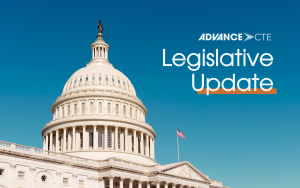 This week, the U.S. Department of Education (ED) proposed significant changes to state Perkins V plans and related reporting requirements, which have significant implications for the law’s ongoing implementation. Elsewhere, Congress continues to grapple with the need to fund the federal government beyond an important upcoming deadline and more.
This week, the U.S. Department of Education (ED) proposed significant changes to state Perkins V plans and related reporting requirements, which have significant implications for the law’s ongoing implementation. Elsewhere, Congress continues to grapple with the need to fund the federal government beyond an important upcoming deadline and more.
ED Proposes Changes to Perkins V State Plans and Reporting
This week, the U.S. Department of Education’s (ED) Office of Career, Technical, and Adult Education (OCTAE) published two new proposals that would significantly impact state and local implementation of the Carl D. Perkins Career and Technical Education (CTE) Act (Perkins V). These new changes to Perkins V state plan requirements and related annual data collections seek to standardize the way in which states and local Perkins V recipients collect and report information related to CTE student performance. Separately, these proposals would increase the broader information gathered by ED via state Perkins V state plans.
As noted in the related proposals, these changes will require every state and territory to submit new or substantially amended four-year Perkins V plans by 2026—an effort and wider process states and territories just completed this year. Comments on these proposals are due back to ED no later than November 12, 2024. Advance CTE is continuing to analyze these proposals and plans to formally provide feedback to the Department as part of this comment period.
Progress on Stopgap Funding Legislation Stalls
This week both chambers of Congress returned to Capitol Hill following its annual August recess period. As Advance CTE shared last week, Republican leaders had been intending to introduce legislation, known as a continuing resolution (CR), to temporarily extend current funding levels for all federal programs, including Perkins V’s basic state grant program, through the early part of 2025. This six-month funding extension is strongly opposed by the Biden administration and the Senate, who prefer a shorter-term CR lasting through mid-December—timing that would coincide with the lame-duck session of the current 118th Congress.
Despite this opposition, House Republican leadership attempted to move forward with this six-month CR, which also contained controversial provisions related to upcoming elections. However, support for this proposal remained uncertain within the House Republican conference, with several GOP lawmakers indicating opposition to this approach. This opposition caused Speaker Mike Johnson (R-LA) to pause further consideration of this CR, at least for the time being. With the start of the 2025 federal fiscal year (FY25) set to begin on October 1, it remains unclear how lawmakers plan to move forward with federal funding for the government beyond this date. As these efforts continue to take shape, Advance CTE will continue to advocate for a strengthened investment in state CTE systems made via Perkins V.
Advance CTE Signs Onto Letter Endorsing Workforce Pell Grant Passage
This week, Advance CTE joined other national and state-based organizations in sending a letter to congressional leadership supporting expanding the federal Pell Grant program to include learners enrolled in high-quality, shorter-term CTE programs. Such legislation has been a longstanding federal policy priority for Advance CTE as a key strategy to provide more learners with quality postsecondary pathways that lead to careers in growing sectors of the economy. The letter also notes these efforts’ critical role in supporting ongoing federal investments in the nation’s infrastructure, advanced manufacturing, and green energy sectors.
HELP Republicans Hold K-12 Education Roundtable
On Tuesday, Senator Bill Cassidy (R-LA) hosted a roundtable to discuss ways to innovate within K-12 education systems to improve learner success. Sen. Cassidy, the ranking member of the Senate Health, Education, Labor, and Pensions (HELP) Committee, was joined by Senators Katie Britt (R-AL), Tommy Tuberville (R-AL), and Joni Ernst (R-IA). Invited panelists discussed innovations in virtual reality, artificial intelligence, work-based learning, and micro-schools throughout their opening remarks and in response to the Senators’ questions.
Ruben Morris, the founder of Alabama Aerospace and Aviation High School, spoke about the need for education to reflect local workforce needs built on public-private partnerships. When Sen. Cassidy asked about available funding through Alabama’s Perkins V investment, Ruben shared that he uses Perkins V funding to support further program growth. He also shared ways in which his community leverages this critical federal investment in CTE, including supporting the development of programming for learners that enables their entry into the aviation economy in the state.
Biden Administration Announces Grants to Recruit Diverse Workforce
Last week, the U.S. Department of Education (ED) announced over $28 million in newly awarded funds through the Teacher Quality Partnership (TQP) program. This latest grant round aims to recruit, prepare, develop, and retain a diverse educator workforce nationwide. The TQP program funds teacher preparation programs in high-need communities for learners at colleges and universities and in teacher residency programs and aims to encourage more people to pursue careers in teaching through Grow Your Own programs. ED announced the list of award recipients alongside new data on Public Service Loan Forgiveness approvals in each state.

